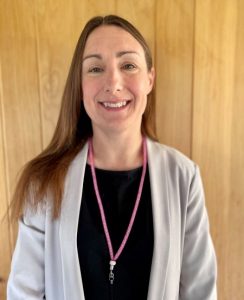 Claire Farrow is the Integrated Services Manager at Hull City Council – holding a wide-ranging portfolio related to the health and wellbeing in children and young people across the city. With a background in public health, her role very often involves presenting population health data at senior level, with a view to influencing change in some of the most challenging societal issues facing children and young people today. Earlier this year, Claire was nominated by her organisation to attend a systems leadership programme run by the Leadership Centre in collaboration with the Office for Health Improvement and Disparities and the Association of Directors of Public Health in the Yorkshire and Humber region. In this blog, Claire shares her experiences of the programme and the impact it has had on her leadership.
Claire Farrow is the Integrated Services Manager at Hull City Council – holding a wide-ranging portfolio related to the health and wellbeing in children and young people across the city. With a background in public health, her role very often involves presenting population health data at senior level, with a view to influencing change in some of the most challenging societal issues facing children and young people today. Earlier this year, Claire was nominated by her organisation to attend a systems leadership programme run by the Leadership Centre in collaboration with the Office for Health Improvement and Disparities and the Association of Directors of Public Health in the Yorkshire and Humber region. In this blog, Claire shares her experiences of the programme and the impact it has had on her leadership.
I was really pleased to be invited to join the programme because I’ve never had any training around systems leadership. I have been exposed to whole system approaches to healthy weight and childhood obesity, but this was different as it was about the system I am working in – how to operate across boundaries and influence even when you don’t have positional power. The sessions were excellent. Just enough input to understand the concepts, but with lots of practical applicability.
I was really keen to make sure that I experimented with the approaches immediately, so that I didn’t lose the learning. Some of the key issues I am working on include young people vaping, the impact of poverty in childhood, children’s emotional wellbeing and mental health and healthy lifestyles in early years. They are massive societal issues which can feel insurmountable. In public health you often look at the big population data and think, ‘my goodness, how are we going to shift that?’ You tend to think it’s all down to you. But of course, that’s not realistic. You can only tackle these issues over time, and with support across the system as a whole. The training helped to remind me that I am just one person in the system – I can’t solve the problem, but I can help illuminate the issues, influence others and make small shifts that change the trajectory.
“The approach definitely produced different results – the feedback I received was really powerful. It seemed to leave an imprint on people in a way that perhaps the data on its own simply couldn’t. People seemed enthusiastic to get onboard and immediately made commitments to support change in their own particular spheres of influence, which was fantastic.”
Not long after I returned to work, I was asked to present data about children and young people vaping to the Health and Wellbeing Board – who are responsible for decision-making on these issues at a place-based level. One of the most powerful things that we learnt during the training was about storytelling. In public health we can be overly focused on the data which, whilst helpful, can be a bit dry. I made a decision to apply some of what I had learnt to see if it resulted in a different outcome. Applying the model of the ‘Story of Self, Us and Now’, I spoke about my own story for the first time. I shared why this issue was important to me; I have children of my own and I don’t want them to be addicted to a substance which is bad for their health and I’m concerned that it is allowed to be freely marketed to them at such a young age. I could see that connected the Board to why I cared about this issue and yet it felt very alien, because you don’t often mention yourself when presenting data of this nature. I would even say it felt a bit risky because I don’t think I’ve ever brought myself to something like that in a professional context. Having said that, it was also completely authentic and I did think, ‘Well, even if they don’t like it, I feel pleased that I’ve been true to myself because I really do believe what I’m saying.’ Knowing from the training that the approach was evidence-based also gave me confidence, because this wasn’t about me ‘needing’ to do this; it was more about knowing that this might be what was needed to help shift the issue in our system.
I then moved to what this meant to the Board. As the body responsible for health and wellbeing in our area, we don’t want large numbers of children addicted to a substance or influenced to begin vaping. We also don’t want children and parents spending money on these products when we are simultaneously trying to address the impact of poverty in childhood.
Finally, I finished with how we could all make a difference to this issue, shifting the dial a bit, by making commitments to lobby Government to adopt more legislation around vaping. In the past, I would probably have listed lots of things we now needed to do, but I learnt through the training that can lead to paralysis in itself, because it’s hard to know where to start. So, I suggested the board identify one small thing that is ‘do-able’ to get the ball rolling.
The approach definitely produced different results – the feedback I received was really powerful. It seemed to leave an imprint on people in a way that perhaps the data on its own simply couldn’t. People seemed enthusiastic to get onboard and immediately made commitments to support change in their own particular spheres of influence, which was fantastic.
Ultimately, success for me will be seeing the government stop the vaping industry from marketing vapes directly to children. I appreciate we are a long way off that point, but the work we are doing locally to dispel myths about vaping and lobby as a Board at place-level is helping to pave the way for change – and the first steps in any journey are important. I’ve learnt that we’ve all got power to influence from wherever we are in the system – just by telling the story and advocating for what we’re after. Sometimes public health can be a bit academic and yet you aren’t taught about systems leadership. It is that which helps bridge the gap from the academia to making it real for the people you are trying to influence. It helps you nudge change in the right direction – and that’s a vitally important first step in tackling some of the biggest societal issues we face.
